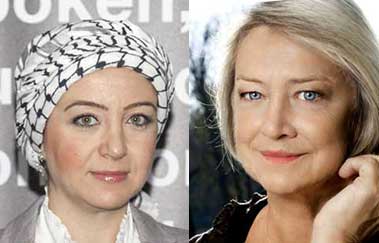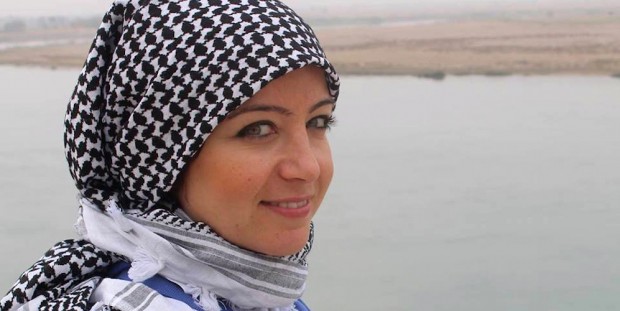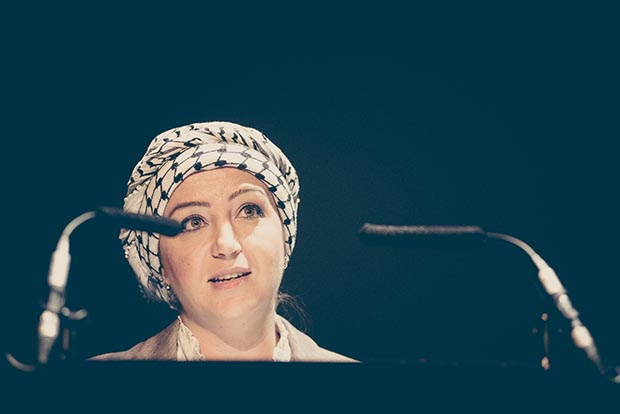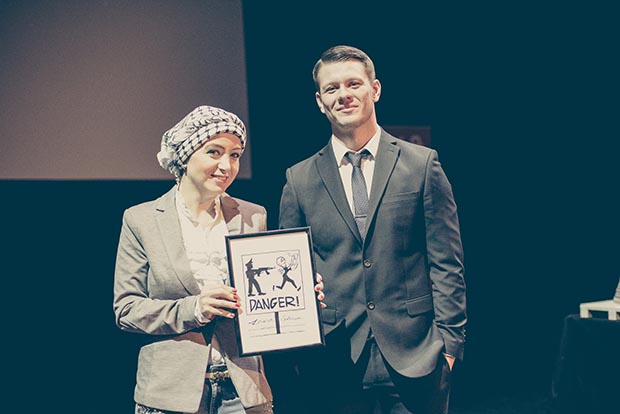#IndexAwards2016 Fellowship update: “We want change now”
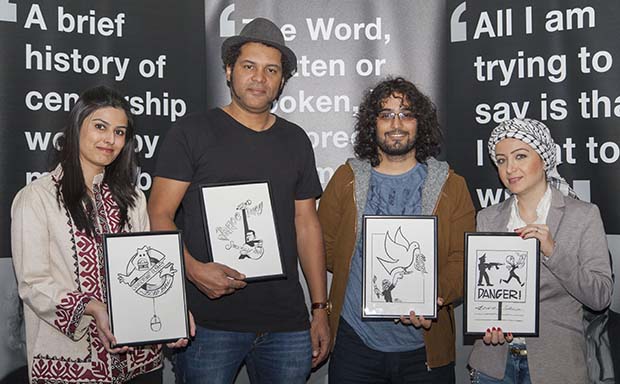
Winners of the 2016 Freedom of Expression Awards: from left, Farieha Aziz of Bolo Bhi (campaigning), Serge Bambara — aka “Smockey” (Music in Exile), Murad Subay (arts), Zaina Erhaim (journalism). GreatFire (digital activism), not pictured, is an anonymous collective. Photo: Sean Gallagher for Index on Censorship
In the short three months since the Index on Censorship Awards, the 2016 fellows have been busy doing important work in their respective fields to further their cause and for stronger freedom of expression around the world.
GreatFire / Digital activism
GreatFire, the anonymous group of individuals who work towards circumventing China’s Great Firewall, has just launched a groundbreaking new site to test virtual private networks within the country.
“Stable circumvention is a difficult thing to find in China so this new site a way for people to see what’s working and what’s not working,” said co-founder Charlie Smith.
But why are VPNs needed in China in the first place? “The list is very long: the firewall harms innovation while scholars in China have criticised the government for their internet controls, saying it’s harming their scholarly work, which is absolutely true,” said Smith. “Foreign companies are also complaining that internet censorship is hurting their day-to-day business, which means less investment in China, which means less jobs for Chinese people.”
Even recent Chinese history is skewed by the firewall. The anniversary of Tiananmen Square protests of 1989 last month went mostly unnoticed. “There was nothing to be seen about it on the internet in China,” Smith said. “This is a major event in Chinese history that’s basically been erased.”
Going forward, Smith is optimistic for growth within GreatFire, and has hopes the new VPN service will reach 100 million Chinese people. “However, we always feel that foreign businesses and governments could do more,” he said. “We don’t see this as a long game or diplomacy; we want change now and so I feel positive about what we are doing but we have less optimism when it comes to efforts outside of our organisation.”
Winning the Index on Censorship Freedom of Expression Award for Digital Activism has certainly helped morale. “With the way we operate in anonymity, sometimes we feel a little lonely, so it’s nice to know that there are people out there paying attention,” Smith said.
Murad Subay / Arts
During his time in London for the Index awards, Yemeni artist Murad Subay painted a mural in Hoxton, which was the first time he had worked outside of his home country. “It was a great opportunity to tell people what’s going on in Yemen, because the world isn’t paying attention,” he explained to Index.
Since going home, Subay has continued to work with Ruins, his campaign with other artists to paint the walls of Yemen. “We launched in 2011, and have continued to paint ever since.”
The Saw mural, Ruins campaign https://t.co/z7XrE2yTP7 pic.twitter.com/ZMiVjhxZO8
— murad subay (@muradsubay) June 10, 2016
Last month, artists from Ruins, including Subay, painted a number of murals in front of the Central Bank of Yemen to represent the country’s economic collapse.
Thi Yazen Alalawi mural, Ruins campaign https://t.co/c2wkosUIxy pic.twitter.com/UqmuSzczAl
— murad subay (@muradsubay) June 10, 2016
In his acceptance speech at the Index Awards, Subay dedicated his award to the “unknown” people of Yemen, “who struggle to survive”. There has been little change in the situation since in the subsequent months as Yemenis continue to suffer war, oppression, destruction, thirst and — with increasing food prices — hunger.
“The war will continue for a long time and I believe it may even be a decade for the turmoil in Yemen to subside,” Subay says. “Yemen has always been poor, but the situation has gotten significantly worse in the last few years.”
Subay considers himself to be one of the lucky ones as he has access to water and electricity. “But there are many millions of people without these things and they need humanitarian assistance,” he says. “They are sick of what is going on in Yemen, but I do have hope — you have to have hope here.”
The Index award has also helped Subay maintain this hope. As has the inclusion of his work in university courses around the world, from John Hopkins University in Baltimore, USA, and King Juan Carlos University in Madrid, Spain.
Subay’s wife has this month travelled to America to study at Stanford University. He hopes to join her and study fine art. “Since 2001 I have not had any education, and this is not enough,” he explains. “I have ideas in my head that I can’t put into practice because i don’t have the knowledge but a course would help with this.”
Zaina Erhaim / Journalism
Syrian journalist and documentary filmmaker Zaina Erhaim has been based in Turkey since leaving London after the Index Awards in April as travelling back to Syria isn’t currently possible. “We don’t have permission to cross back and forth from the Turkish authorities,” she told Index. “The border is completely closed.”
Erhaim is with her daughter in Turkey, while her husband Mahmoud remains in Aleppo.
“The situation in Aleppo is very bad,” she said. “A recent Channel 4 report by a friend of mine shows that the bombing has intensified, and the number of killings is in the tens per day, which hasn’t been the case for some weeks; it’s terrible.”
The main hospital in Aleppo was bombed twice in June. “Sadly this is becoming such a common thing that we don’t talk about it anymore,” Erhaim added.
She has largely given up on following coverage of the war in Syria through US or UK-based media outlets. “It is such a wasted effort and it’s so disappointing,” she explained. “I follow a couple of journalists based in the region who are actually trying to report human-side stories, but since I was in London for the awards, I haven’t followed the mainstream western media.”
Erhaim has put her own documentary making on hold for now while she launches a new project with the Institute for War and Peace Reporting this month to teach activists filmmaking skills. “We are going to be helping five citizen journalists to do their own short films, which we will then help them publicise,” she said.
Documentary filmmaking is something she would like to return to in future, “but at the moment it is not feasible with the situation in Syria and the projects we are now working on”.
Bolo Bhi / Campaigning
The last time Index spoke to Farieha Aziz, director of Bolo Bhi, the Pakistani non-profit, all-female NGO fighting for internet access, digital security and privacy, the country’s lower legislative chamber had just passed the cyber crimes bill.
The danger of the bill is that it would permit the Pakistan Telecommunication Authority to manage, remove or block content on the internet. “It’s part of a regressive trend we are seeing the world over: there is shrinking space for openness, a lot of privacy intrusion and limits to free speech,” Aziz told Index.
Thankfully, when the bill went to the Pakistani senate — which is the upper house — it was rejected as it stood. “Before this, we had approached senators to again get an affirmation as they’d given earlier saying that they were not going to pass it in its current form,” Aziz added.
Bolo Bhi’s advice to Pakistani politicians largely pointed back to analysis the group had published online, which went through various sections of the bill and highlighting what was problematic and what needed to be done.
This further encouraged those senators who were against the bill to get the word out to their parties to attend the session to ensure it didn’t pass. “It’s a good thing to see they’ve felt a sense of urgency, which we’ve desperately needed,” Aziz said.
“The strength of the campaign throughout has actually been that we’ve been able to band together, whether as civil society organisations, human rights organisations, industry organisations, but also those in the legislature,” Aziz added. “We’ve been together at different forums, we’ve been constantly engaging, sharing ideas and essentially that’s how we want policy making in general, not just on one bill, to take place.”
The campaign to defeat the bill goes on. A recent public petition (18 July) set up by Bolo Bhi to the senate’s Standing Committee on IT and Telecom requested the body to “hold more consultations until all sections of the bill have been thoroughly discussed and reviewed, and also hold a public hearing where technical and legal experts, as well as other concerned citizens, can present their point of view, so that the final version of the bill is one that is effective in curbing crime and also protects existing rights as guaranteed under the Constitution of Pakistan”.
A vote on an amended version of the bill is due to take place this week in the senate.
Smockey / Music in Exile Fellow
Burkinabe rapper and activist Smockey became the inaugural Music in Exile Fellow at the Index on Censorship Freedom of Expression Awards, and last month his campaigning group Le Balai Citoyen (The Citizen’s Broom) won an Amnesty International Ambassador of Conscience Award.
“This was was given to us for our efforts in the promotion of human rights and democracy in our country,” said Smockey. The award was also given to Y en a marre (Senegal) and Et Lucha (Democratic Republic of the Congo).
“We are trying to create a kind of synergy between all social-movements in Africa because we are living in the same continent and so anything that affects the others will affect us also,” Smockey added.
Le Balai Citoyen has recently been working on programmes for young people and women. “We will also meet the new mayor of the capital to understand all the problems of urbanism,” Smockey added.
While his activism has been getting international recognition, he remains focused on making music with upcoming concerts in Belgium, Switzerland and Germany, and he is currently writing the music for an upcoming album. A major setback has seen Smockey’s acclaimed Studio Abazon destroyed by a fire early in the morning of 19 July. According to press reports the studio is a complete loss. The cause is under investigation.
Despite this, Smockey is still planning to organise a new music festival in Burkina Faso. “We want to create a festival of free expression in arts,” Smockey said. “And we are confident that it will change a lot of things here.”
He is thankful for the exposure the Index Awards have given him over the last number of months. “It was a great honour to receive this award, especially because it came from an English country,” he said. “My people are proud of this award.”

